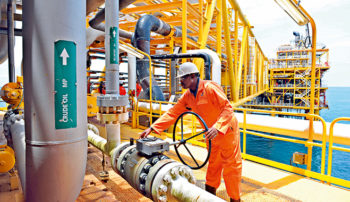
According to the Wall Street Journal, the United Kingdom, Brazil and Nigeria are the nations with the highest cost of oil production in the world with $44.33, $34.99 and $28.99 production cost respectively. The countries with the least cost of oil production are Saudi Arabia with $8.98, Iran and Iraq, with $9.08 and $10.57 respectively. The breakdown of the production cost in Nigeria as reflected in the National Petroleum Policy shows that $8.81 is for production costs, $13.19 for capital spending, $4.11 for gross taxes and $2.95 for administration/transport per barrel. The figures show that if the international crude oil price goes for $56 per barrel, for example, Nigeria would be spending half of that price on production cost. This is obviously not good for our economy. The Minister of State for Petroleum, Dr. Ibe Kachikwu had mentioned in August this year that it was no longer feasible and economically viable for the country to be producing oil at an exorbitant cost considering the fall in oil prices. Consequently, the Minister spearheaded the formulation of the National Petroleum Policy, which was approved by the Federal Executive Council in July this year. Among many other things, the Policy set a target of $10 as the production cost of a barrel of crude oil in Nigeria.
Considering the nature of the oil market and the structure of OPEC, which we belong, it is practically impossible for a country to unilaterally fix the crude oil price and sell at a rate it considers sufficiently profitable. As a result, it is incumbent on every country to adopt ingenious means to maximise profit. In simple economics, one of the best ways to make more profit is basically to reduce average production cost. With the current reality in the oil market, there is no better time for the government and all relevant stakeholders to join hands together to ensure a framework that will drastically reduce the cost of producing crude oil in Nigeria. This will surely yield extraordinary benefits for the economy. Typically, it will attract new investors into the country. Similarly, existing investors who have suspended capital projects or diverted such projects to other countries will be incentivised to revivify such projects in the country.
Also, more activities in the industry will naturally translate to more profit for oil companies in Nigeria, which also means more revenue for the government. Well performing oil companies invariably means more jobs and local content patronage for oil and gas services companies. The attendant benefits are just endless and alluring.
In a commendable fashion, the Nigerian National Petroleum Corporation recently reported that it had reduced the production cost by 70% between 2014 and now. The report delivered by the NAPIMS Group General Manager, Dafe Sejebor, hinted that the corporation reduced the production cost from $78 to $23 dollar. He further stated that the country had saved a minimum of $3 billion per annum as a result of the reduction in production cost. This is a step in the right direction and should be commended by all stakeholders. We can only imagine how much would accrue to the country if the cost is further reduced to $10 per barrel.
Going forward, the Minister of State for Petroleum and the NNPC team must not rest in the effort to bring down the cost. The government should double effort to ensure that the target of $10 per barrel production cost is attained. It is an achievable target that must be pursued diligently. One of the many steps to take will be to sincerely and assuredly resolve the Niger Delta conflict once and for all. Also there is need for government to address the infrastructural challenges in the industry. The other crucial aspect is the issue of multiple taxation in the industry. There is need for a proper harmonisation of the many taxes in order not to burden oil companies with taxes that discourage production and business growth.
The most significant element towards the reduction of the production cost and addressing the many challenges in the industry is the passage of the Petroleum Industry Bill (PIB), which has been passed by the Senate but still pending in the House of Representatives. Additionally, increased adherence to the local content policy will also drastically impact the cost of production positively. The other side of the coin is for local practitioners to also develop capacity to make them fitting for the available jobs.
Essentially, the drive to reduce crude oil production cost in the country is not a single ministry affair; it is a collective responsibility that requires the cooperation of all stakeholders. The Minister of State for Petroleum should join hands with his counterparts in the Ministry of Finance, Ministry of Transportation, Ministry of Niger-Delta Affairs; Ministry of Defence, Ministry of Trade and Investment, and the Ministry of Science and Technology, in order to ensure that the target is achieved. All hands must be on deck in this drive.
Copyright Ships & Ports Ltd. Permission to use quotations from this article is granted subject to appropriate credit given to www.shipsandports.com.ng as the source.
